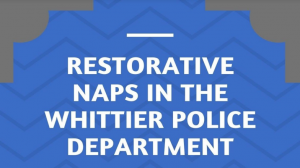~Nicolai Andersen, Rachel Medina, Hannah Ontiveros, K’Yanna Wesley, Julie Zendejas
Faculty Advisor: Dr. David Gonzalez, Jr.
Our capstone group evaluated the potential benefits of implementing restorative nap policies for the Whittier Police Department in Los Angeles County. Through our research, we conducted a literature review of the prevalence of sleep disorders in law enforcement, the impacts of napping, and how sleep relates to mental health among police officers. We administered a survey to police and fire departments with similar policies in place and analyzed their responses in order to develop recommendations for the Whittier Police Department.
We found this to be an interesting topic, as police work comprises one of the largest groups of shift workers in the U.S. Police performance has also been under increased scrutiny in recent years due to increased media attention and adverse publicity. Innovations in communications and information technology have made it easier than ever to detect and report instances of police brutality through cell phone video-recording and social media sharing. Movements such as Black Lives Matter have also helped bring increased scrutiny on inadequate police performance in recent years. When researching existing data on sleep disorders in America’s police forces, we found as many as 40% of officers identified as having at least one sleep disorder. The 2011 Harvard Work Hours and Safety Group Police Study found one-third of North American police officers screening positive for obstructive sleep apnea (Rajaratnam, 2011). This is 44% higher than the general population (Conn, 2018).
This study accompanied by other existing data from our literature review found officers with sleep disorders to be more likely to report negative safety events, such as falling asleep while driving or poorer work performance. In the Harvard study, more than one in four officers also reported having fallen asleep while driving at least once a month. Exhibiting uncontrollable anger towards suspects was also reported as more likely among officers with sleep disorders (Kitaeff, 2019).
To investigate whether restorative naps had any benefits for police officers and public safety, we were able to recruit four public safety agencies with existing restorative nap programs to participate in a survey. Results showed that sleep-deprived officers were more likely to fall asleep while driving, had a higher incidence of citizen complaints, and were more prone to making administrative and/or safety errors. Survey participants also noted a variety of benefits since the implementation of restorative nap policies. Reno Police Department noted that their policies had led to better attitudes, sharper focus, and increased problem-solving capabilities, along with increased safety, happier employees, and a decline in chronic sleep problems. Overall, across all survey participants, we found all agencies positively accepting their restorative nap programs. Since the implementation of these pioneering policies in the Henderson Police Department, Hampton Police Department, and Reno Police Department, a number of positive effects have been reported, including increased public safety and improved work performance.
With many police officers resting during their short lunch breaks or at inappropriate times, often considered misconduct, developing a program with a formal policy for napping would not only benefit public safety but also officer’s overall well-being, health, and work performance. Therefore, based on the existing data and our survey results, it was our recommendation that the Whittier Police Department would be wise in implementing a similar program.
References
Conn, Stephanie M. (2018). Increasing Resilience in Police and
Emergency Personnel: Strengthening Your Mental Armor.
Routledge. ISBN 9781317193753.
Kitaeff, Jack (2019). Handbook of Police Psychology. Routledge. p. 551.
ISBN 9780429554667.
Rajaratnam, S.W., Brager, L.K., Lockley, S.W., Shea, S.A., Wang, W.,
Landrigan, C.P. & Czeisler, C.A. (2011). Sleep disorders, health and
safety in police officers. Journal of the American Medical
Association, 306, pp. 2567-2578.

